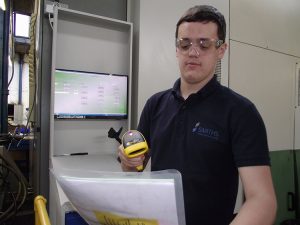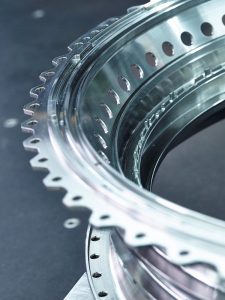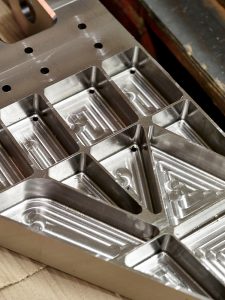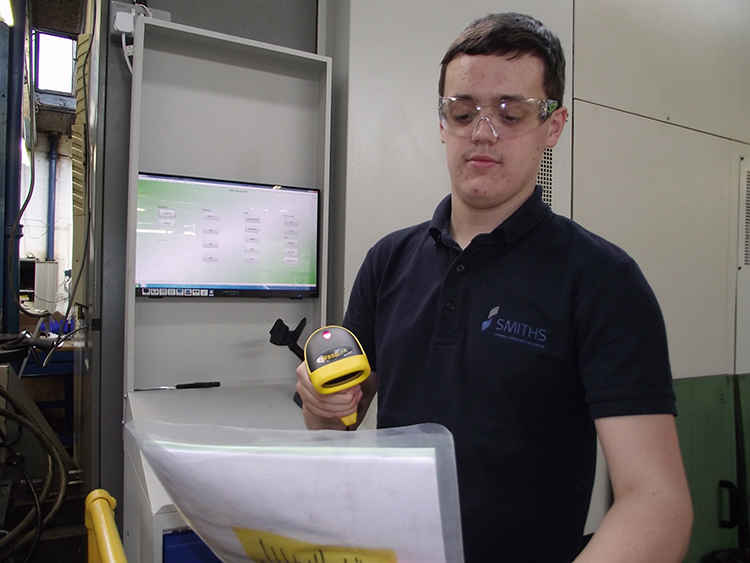Smiths Harlow has built a reputation manufacturing a range of commercial aircraft components for customers such as Rolls-Royce, Bombardier, Safran, GKN and a number of tier one companies. Focusing on aero engine parts from 200 to 3000 mm diameter, plus prismatic parts of 1000 mm3 and above, the company runs an array of sturdy CNC machines capable of working with hard on exotic metals such as Inconel 718, Waspaloy, nickel alloy C263, and Haynes 188. Smiths Harlow also machines softer metals that include aluminium and magnesium.

Among the components currently going through the shop floor are titanium aero engine casings – the visible part at the front of the engine containing the fan blades – and high-pressure turbine casings. All programs for the company’s machine tools, which include lathes, vertical mills and machining centres, are developed in Edgecam, from Vero Software. The machines include a six-pallet Burkhardt & Weber machining centre, which cuts most of the titanium parts at Smiths Harlow, and a recently installed Dugard DBM 2150 five-axis bed mill, along with other models supplied by Cincinnatti, Kitamura, Toshiba, Mandelli, Deckel Maho, Kia, Mazak and Boehringer.
Engineering manager Tim Hambridge says the company uses Edgecam’s ‘Part Modeller’ function for design, getting the correct stock sizes, laying out any tooling lugs in the material, fixture design, clamps, and fixture drawing. “Then we move on to part programming in Edgecam, using Waveform roughing on both milling and turning.”
Smiths Harlow’s private equity investor (Agathos) is looking to grow the once family-owned firm. Former wartime Spitfire pilot Gerald Smith founded the company over 60 years ago, and director Ian Knightley says with recent investment by Agathos, machine tools and manufacturing systems are being upgraded.

A recent upgrade to Javelin 2017, also from the Vero Software stable, has been providing the infrastructure basis to become more “data-centric” with full real-time information feedback. This is a major element to promote growth at Smiths Harlow, either by acquisition or organically.
Upgrading the company’s Javelin production control software was the catalyst for the aerospace manufacturer to roll the system out across its business, enabling the provision of more data to control the organisation and meet the investor’s growth objectives. Moreover, rolling out the Javelin shop floor data capture system to many of the 70-strong workforce across the 60,000 sq ft factory was a vital part of development plans.
“We’d been using a 10-year-old version of Javelin’s predecessor, Jobshop, which contained many bespoke items,” says Knightley, “but we only really used it as a production control MRP system. We’re now taking advantage of Javelin’s capabilities to give us full control over the business, as it provides us with more comprehensive information that we need about all aspects of our processes.”
A component’s Javelin journey begins with sales order processing. Some come in by EDI, while others are entered manually.
“MRP is vital to us,” says Knightley. “Working almost exclusively on aerospace parts, we know at least a year in advance what the customer is looking for, and we need to be flowing that information through to our suppliers. For instance, some forgings that we purchase have a lead time of between 40 and 50 weeks. Therefore, the MRP function helps us give suppliers a good signal of our future requirements.”
Knightly says that purchase orders flow naturally out of MRP: “A central area previously produced all of our purchase orders, and everyone would go there to authorise them. Section managers now raise their own purchase orders in Javelin, which are also authorised within the software.”
Every job going through the machine shop carries a routing card, with all relevant documentation – such as drawings, operation sketches and self-inspection sheets – attached to it through Javelin’s document linking and viewing functionality.

“We can print those documents to ensure that the shop floor operator has the latest data and documents relating to the job they’re working on,” says Knightley.
Updating to Javelin 2016 R2, quickly followed by 2017 R1, has revolutionised Smiths Harlow’s scheduling. Previously, ‘work-to’ lists were printed weekly for each machine. Now, this information is available to managers around the business through Javelin. And with a number of shop floor data capture terminals throughout the workshop, each operator can readily see forthcoming jobs.
“Until recently, operators were working with paper timesheets, but now they’re logging on and off Javelin each day through SFDC, and processing each stage of their work.”
The materials control functionality is particularly important to the company, as Smiths Harlow needs to adhere to the aerospace industry’s strict traceability requirement.
“We use the serial number feature within Javelin, so we can now tie all items down to serial numbers as they go to the machine shop,” states Knightley.
Costing gives the company the ability to analyse every job by the actual hours against the planned hours for each operation. Now, Smiths Harlow can view a complete snapshot for each job – drill right down and see the materials allocated to it, and pull data out of the system on an ad-hoc or monthly basis for further analysis.
In conclusion, Knightley says that Javelin’s simple systems management meant the company could easily customise screens, creating hotkeys for functions that are used regularly. Having those keys on the Javelin desktop instead of having to go down the tree structure has accelerated the process considerably.
“Everything is now rolled up into the one system for everyone,” he says. “Javelin provides more real-time data about the business, which is easy to analyse, and enables customised and complex Crystal Reports to be produced. It gives us full control of the business.”
For further information
www.edgecam.com
www.javelin-mrp.com














